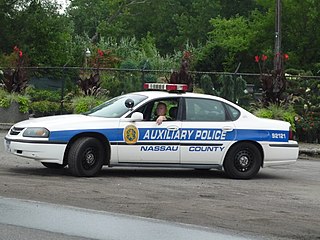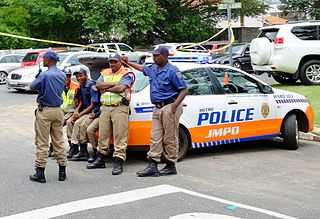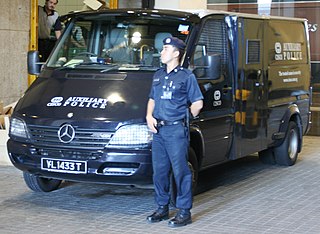Related Research Articles

Law enforcement is the activity of some members of government who act in an organized manner to enforce the law by discovering, deterring, rehabilitating, or punishing people who violate the rules and norms governing that society. The term encompasses police, courts, and corrections. These three components may operate independently of each other or collectively through the use of record sharing and cooperation. Throughout the world, law enforcement are also associated with protecting the public, life, property, and keeping the peace in society.

Organized crime or organised crime is a category of transnational, national, or local group of centralized enterprises run to engage in illegal activity, most commonly for profit. While organized crime is generally thought of as a form of illegal business, some criminal organizations, such as terrorist groups, rebel forces, and separatists, are politically motivated. Many criminal organizations rely on fear or terror to achieve their goals or aims as well as to maintain control within the organization and may adopt tactics commonly used by authoritarian regimes to maintain power. Some forms of organized crime simply exist to cater towards demand of illegal goods in a state or to facilitate trade of goods and services that may have been banned by a state. Sometimes, criminal organizations force people to do business with them, such as when a gang extorts protection money from shopkeepers. Street gangs may often be deemed organized crime groups or, under stricter definitions of organized crime, may become disciplined enough to be considered organized. A criminal organization can also be referred to as an outfit, a gang, crime family, mafia, mob, (crime) ring, or syndicate; the network, subculture, and community of criminals involved in organized crime may be referred to as the underworld or gangland. Sociologists sometimes specifically distinguish a "mafia" as a type of organized crime group that specializes in the supply of extra-legal protection and quasi-law enforcement. Academic studies of the original "Mafia", the Italian Mafia generated an economic study of organized crime groups and exerted great influence on studies of the Russian mafia, the Chinese triads, the Hong Kong triads, and the Japanese yakuza.

Vigilantism is the act of preventing, investigating and punishing perceived offenses and crimes without legal authority.

Secret police are police, intelligence, or security agencies that engage in covert operations against a government's political, religious, or social opponents and dissidents. Secret police organizations are characteristic of authoritarian and totalitarian regimes. They protect the political power of a dictator or regime and often operate outside the law to repress dissidents and weaken political opposition, frequently using violence. They may enjoy legal sanction to hold and charge suspects without ever identifying their organization.

Law enforcement in China consists of an extensive public security system and a variety of enforcement procedures used to maintain order in the country. Along with the courts and procuratorates, the country's judicial and public security agencies include the Ministry of Public Security (MPS) and the Ministry of State Security (MSS), with their descending hierarchy of departments, bureaus, subbureaus, and stations.
Extrajudicial punishment is a punishment for an alleged crime or offense which is carried out without legal process or supervision by a court or tribunal through a legal proceeding.

The Arizona Rangers are a noncommissioned civilian auxiliary that supports law enforcement in the state of Arizona.
Special police usually describes a police force or unit within a police force whose duties and responsibilities are significantly different from other forces in the same country or from other police in the same force, although there is no consistent international definition. A special constable, in most cases, is not a member of a special police force (SPF); in countries in the Commonwealth of Nations and often elsewhere, a special constable is a voluntary or part-time member of a national or local police force or a person involved in law enforcement who is not a police officer but has some of the powers of a police officer.

The Fraternal Order of Police (FOP) is a fraternal organization consisting of sworn law enforcement officers in the United States. It reports a membership of over 355,000 members organized in 2,100 local chapters (lodges), state lodges, and the national Grand Lodge. The organization attempts to improve the working conditions of law enforcement officers and the safety of those they serve through education, legislation, information, community involvement, and employee representation.
Political repression is the act of a state entity controlling a citizenry by force for political reasons, particularly for the purpose of restricting or preventing the citizenry's ability to take part in the political life of a society, thereby reducing their standing among their fellow citizens. Repression tactics target the citizenry who are most likely to challenge the political ideology of the state in order for the government to remain in control. In autocracies, the use of political repression is to prevent anti-regime support and mobilization. It is often manifested through policies such as human rights violations, surveillance abuse, police brutality, imprisonment, involuntary settlement, stripping of citizen's rights, lustration, and violent action or terror such as the murder, summary executions, torture, forced disappearance, and other extrajudicial punishment of political activists, dissidents, or general population. Direct repression tactics are those targeting specific actors who become aware of the harm done to them while covert tactics rely on the threat of citizenry being caught. The effectiveness of the tactics differ: covert repression tactics cause dissidents to use less detectable opposition tactics while direct repression allows citizenry to witness and react to the repression. Political repression can also be reinforced by means outside of written policy, such as by public and private media ownership and by self-censorship within the public.

Auxiliary police, also called volunteer police, reserve police, assistant police, civil guards, or special police, are usually the part-time reserves of a regular police force. They may be unpaid volunteers or paid members of the police service with which they are affiliated.

The Federal Criminal Police Office of Germany is the federal investigative police agency of Germany, directly subordinated to the Federal Ministry of the Interior. It is headquartered in Wiesbaden, Hesse, and maintains major branch offices in Berlin and Meckenheim near Bonn. It has been headed by Holger Münch since December 2014.
Company police, also called private police, are privately paid law enforcement officers who work for private security companies or private military companies rather than a municipal, county, state, or national agency.

There were widespread reports of systematic and escalating violations of human rights in Zimbabwe under the regime of Robert Mugabe and his party, ZANU-PF, between 1980 and 2017.

Law enforcement in South Africa is primarily the responsibility of the South African Police Service (SAPS), South Africa's national police force. SAPS is responsible for investigating crime and security throughout the country. The "national police force is crucial for the safety of South Africa's citizens" and was established in accordance with the provisions of Section 205 of the Constitution of South Africa.

Private police or special police are law enforcement bodies that are owned and/or controlled by non-governmental entities. Additionally, the term can refer to an off-duty police officer while working for a private entity, providing security, or otherwise law enforcement-related services. These officers do have power to uphold the laws under the discretion of the private company.

Angola has long been severely criticized for its human rights record. A 2012 report by the U.S. Department of State said, "The three most important human rights abuses [in 2012] were official corruption and impunity; limits on the freedoms of assembly, association, speech, and press; and cruel and excessive punishment, including reported cases of torture and beatings as well as unlawful killings by police and other security personnel. Other human rights abuses included: harsh and potentially life-threatening prison conditions; arbitrary arrest and detention; lengthy pretrial detention; impunity for human rights abusers; lack of judicial process and judicial inefficiency; infringements on citizens' privacy rights and forced evictions without compensation; restrictions on nongovernmental organizations; discrimination and violence against women; abuse of children; trafficking in persons; discrimination against persons with disabilities, indigenous people, and persons with HIV/AIDS; limits on workers' rights; and forced labor." In 2022, Freedom House rated Angola "not free".
The legal system of Ukraine is based on civil law, and belongs to the Romano-Germanic legal tradition. The main source of legal information is codified law. Customary law and case law are not as common, though case law is often used in support of the written law, as in many other legal systems. Historically, the Ukrainian legal system is primarily influenced by the French civil code, Roman Law, and traditional Ukrainian customary law. The new civil law books were heavily influenced by the German Bürgerliches Gesetzbuch.
The following outline is provided as an overview of and introduction to law enforcement:

A security guard is a person employed by a government or private party to protect the employing party's assets from a variety of hazards by enforcing preventative measures. Security guards do this by maintaining a high-visibility presence to deter illegal and inappropriate actions, looking for signs of crime or other hazards, taking action to minimize damage, and reporting any incidents to their clients and emergency services, as appropriate.
References
- ↑ Mazo, John (July 2010). "How private security officers perceive themselves relative to police". Security Journal. 23 (3): 192–205. doi:10.1057/sj.2008.16. ISSN 0955-1662. S2CID 153542960. ProQuest 504598950.
The term 'parapolice' has acquired a measure of currency among some criminologists and is one that connotes a relationship as well as a distinction between private security and public police. The word 'parapolice' was first deployed in legislation that attempted to define penalties for neighbourhood watch group members who falsely identified as police officers and was thus specifically portrayed as illicit. More recently, sociologists and criminologists ... have made use of the expression in ways that do not treat it as an inherently illegal practice.
- ↑ Sapio, Flora (2010-11-24). Sovereign Power and the Law in China: zones of exception in the criminal justice system. Rochester, NY: BRILL. SSRN 2530326.
Para-police bodies exist more or less in the absence of any appropriate legal basis, are closely linked to the police, and in practice wield some of their powers.
- ↑ G. Rigakos, “Hyperpanoptics as Commodity: The Case of the Parapolice” (1999) 24:3 Canadian Journal of Sociology at 388–389.
- ↑ Rigakos, George (2002-01-01). The New Parapolice: Risk Markets and Commodified Social Control . University of Toronto Press. ISBN 9780802084385.
- ↑ Ross McLeod. "Whose Intelligarde, firm was the subject of Rigakos' critical book, more sympathetically defines his organization as an "evolutionary step in private law enforcement".
- ↑ Ross McLeod. Parapolice: A Revolution in the Business of Law Enforcement. Toronto: Boheme Press. ASIN 1894498062.
- ↑ "Window on China, (Jan. 1, 2008). Public anger over "parapolice" reveals city administration dilemma www.news.cn". Archived from the original on 2008-01-16.
- ↑ "Amnesty International, Press Release (June 5, 2008)".
- ↑ "Para police Extermination. (August 23, 2004), Devil's Excrement". 23 August 2004.
- ↑ Huggins, Martha Knisely (1991-01-01). Vigilantism and the State in Modern Latin America: Essays on Extralegal Violence. Praeger. ISBN 9780275934767.